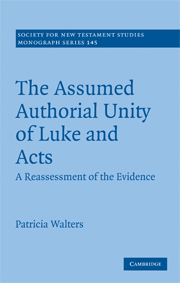Book contents
- Frontmatter
- Contents
- List of figures
- Acknowledgments
- List of abbreviations
- 1 Background and methodology
- 2 Authorial data: seams and summaries
- 3 Authorial criteria: Greek prose compositional conventions
- 4 Authorial unity: analysis results and probabilities
- 5 Final considerations and future directions
- Appendix
- Bibliography
- Index of Biblical and Other Ancient Sources
- Index of Modern Authors and Subjects
- References
4 - Authorial unity: analysis results and probabilities
Published online by Cambridge University Press: 24 June 2009
- Frontmatter
- Contents
- List of figures
- Acknowledgments
- List of abbreviations
- 1 Background and methodology
- 2 Authorial data: seams and summaries
- 3 Authorial criteria: Greek prose compositional conventions
- 4 Authorial unity: analysis results and probabilities
- 5 Final considerations and future directions
- Appendix
- Bibliography
- Index of Biblical and Other Ancient Sources
- Index of Modern Authors and Subjects
- References
Summary
Using, then, as my main criterion simply that the speeches of Lysias are composed in a pleasing style, I have come to suspect many of the speeches which have been commonly regarded as genuine. I put them to the test and found them spurious, not because there was anything wrong with them in a general way, but because they did not strike me with that characteristic Lysianic charm or with the euphony of that style.
(Dion. Hal. Lys. 12)Dionysius was concerned incidentally with problems of ascription and chronology throughout his career as a literary critic. In the early Lysias he shows how, in the absence of internal chronological or other evidence, a developed literary taste could be called into service as the final judge of authorship.
Although the once solid theological, thematic, generic, structural, and narrative unity of Luke and Acts has been challenged as to the extent of the two books' interwoven textuality, authorial unity has remained virtually closed to scholarly scrutiny. The paucity of modern inquiry into the single authorship hypothesis is worrisome at best, ill-considered at worst.
Both ancient and modern literary critics are intrigued by authorship issues. On the one hand, modern critics are at a disadvantage. We cannot possess the same “developed literary taste” as the ancient critics, because the Greek of the classical and post-classical eras is decidedly remote from modern linguistic sensibilities.
Information
- Type
- Chapter
- Information
- The Assumed Authorial Unity of Luke and ActsA Reassessment of the Evidence, pp. 137 - 189Publisher: Cambridge University PressPrint publication year: 2009
